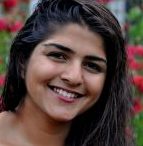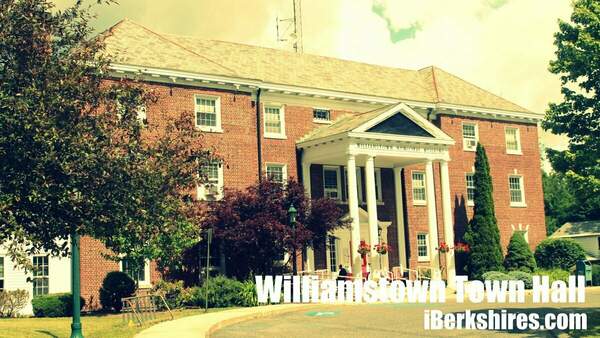Williams Seniors Awarded Florence Chandler Memorial Fellowships
 |
WILLIAMSTOWN, Mass. — Williams College seniors Sarah Cooperman and Ananya Mayukha have been awarded Class of 1945 Florence Chandler Memorial Fellowships, awards that provide a $30,000 grant to support a year of purposeful, independent study outside the United States.

Cooperman, a biology and environmental studies double major from Westport, Conn., developed a deep interest in bats after she took classes in ecology at Williams. During the summer of 2015, she studied the field ecology of little brown bats in Alaska under a National Science Foundation grant. As a part of her work, Cooperman helped researchers set up ultrasonic bat recorders and operate bat nets in the Chugach National Forest and at breeding sites located throughout the Prince William Sound and south central Alaska. Upon returning to Anchorage, she helped document and analyze thousands of bat recordings obtained at sites.
Her Chandler project, "Lucky Bats or Flying Rats? Exploring Global Perceptions of Bats," would take her to Japan, the Kingdom of Tonga, Australia, Ecuador and Latvia to experience a wide spectrum of reactions to bats across cultures — from disgust to honor. Her goal is to investigate human relationships with bats rather than the bats themselves to understand the societal aspects that influence human perspectives. Cooperman wants to examine how economics, historical interactions and folk stories shape the images of bats and what those perceptions mean for conservation efforts. She plans to record bat calls in each country and create vocal or instrumental pieces that capture the essence of each community of bats and to probe her own belief that bats are intelligent musicians rather than pests.
"I am beyond thrilled and grateful to have received the Chandler Fellowship," Cooperman said. "I'm excited to spend next year understanding what factors influence the many ways people around the globe react to bats, which I think are often very misunderstood critters here in the U.S. I think this project will be an immensely challenging, confusing, and stimulating experience, and I look forward to connecting and exploring my own identities as a musician and biologist throughout the year. This is a truly humbling opportunity, and I cannot wait to get going."
Cooperman, the daughter of Jonathan (Class of 1982) and Mary Cooperman, plans to pursue graduate studies in environmental history or policy to make science accessible as a science writer, environmental lawyer, or by working for a non-profit that seeks to better connect people to the outdoors. She hopes to write about species that are widely perceived as unappealing, yet are important to their ecosystems and human economies.
At Williams, Cooperman has been involved with Williams Outdoor Orientation for Living as First-Years (WOOLF), a member of the Williams Outing Club, a junior advisor for first-year students, rowed with the women’s crew team, and sang with the a cappella group The Ephlats.

Mayukha, a psychology major from Ann Arbor, Mich., has long been interested in human connection. As a high school student, she devised a study to test the specific musical preferences of autistic children. During the summer between her freshman and sophomore year at Williams, she shadowed an oncologist at the University of Michigan Cancer Center, and says while she admired the doctor's honesty with her patients as she communicated about the fatal nature of their disease, she wondered if that honesty took away their hope. She returned the next summer with a study she created, interviewing cancer patients about the role of hope in their lives. The summer before her senior year at Williams, Mayukha spent time speaking to cancer patients again, but this time at the intensive care unit at the Mayo Clinic, exploring connection with strangers.
Her Chandler project, "Stories About Strangers: Collecting and Creating Moments of Human Connection," would take her to Sweden, Japan and Hungary to explore human connection across different cultures and better understand barriers in human interactions. She plans to collect stories from strangers about moments of connection with other strangers. Each stranger will recommend a friend for Mayukha to interview, which in turn will determine the direction of her project. Noting every culture has a different attitude toward outsiders, she plans to visit three countries on different points of the Migration Integration Policy Index to explore how people in each country relate to strangers.
"Though this project is about human connection, it also represents contradiction because it means I will be spending a lot of time alone in places that are not familiar to me. I feel that Williams, where I have been surrounded, supported, and nurtured, has provided me the courage to be alone next year as I explore my project," Mayukha said.
Mayukha also credits her parents, Drs. Venkatesh Prasad and Malini Raghavan, with providing her courage to pursue this project. "When I was little, there was a period of time when I would cry every day, because I worried that my parents would die. One time, I was crying in the parking lot of our local grocery store, and I remember my Dad kneeling next to me and telling me that even when he and Mama die, they will be with me in my heart," Mayukha explained. "As I think about how I will feel when I am alone next year, I also think about how my parents will feel. I imagine it will be a difficult year for them, and that they might feel some adult version of the worry I felt every day when I was little. That memory with my Dad is comforting, because it reminds me that we will always carry each other in our hearts."
At Williams, Mayukha has been president of Williams Speaks, a collaborative project between local elementary school teachers and Williams students to provide weekly lessons in public speaking involving confidence-building and storytelling activities; a member of Storyboard, a project that provides students a way to tell their stories and for their peers to learn about the diversity of the student body; and a member of the student liaison committee for the psychology Department.
Tags: Williams College,















